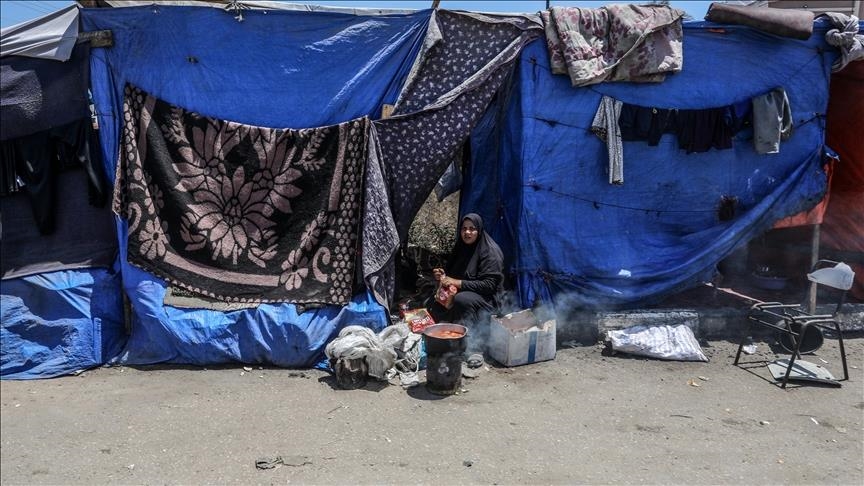Gazans struggle with hunger as Israel's blockade forces some to eat tree leaves
'Famine is haunting Gaza City and north once again. The situation is getting worse,' says Said Abu Abdo from Gaza City

- 'Famine is haunting Gaza City and north once again. The situation is getting worse,' says Said Abu Abdo from Gaza City
- Israel's targeting health services in Gaza exacerbated malnutrition, weakened immunity, spread of infectious diseases, says Said Abu Abdo
- 'There's nothing we can eat -- no vegetables, fruits, meat, nothing,’ says Said Abu Abdo
GAZA
Palestinians are struggling with famine and trying to satisfy their hunger by eating tree leaves in the Gaza Strip, where Israel has been carrying out attacks for nine months.
Said Abu Abdo, who lives in Gaza City, is searching for ways to convince his son Majid, 8, and daughter Sara, 5, to eat mulberry tree leaves cooked with rice.
Abu Abdo tries to persuade the children, noting that they are similar to the grape leaves they used to eat before Israel began attacking.
But due to their bitter taste, the children refuse to eat.
The effects of famine, with the lack of necessities in the area, are clearly visible from the weak bodies, pale faces and tired expressions of Abu Abdo and his children.
"Famine is haunting Gaza City and the north once again. The situation is getting worse. With Israel closing the border crossings and blocking aid and supplies, we have resorted to eating tree leaves," he told Anadolu.
Abu Abdo highlighted that Israel's targeting of health services has exacerbated malnutrition, weakened immunity and the spread of infectious diseases due to an inadequate health care infrastructure and restricted access to aid and supplies.
He is concerned about his children, who have contracted contagious diseases like hepatitis and gastroenteritis multiple times because of the absence of proper and healthy food.
Israel's control of border crossings and blocking humanitarian aid has caused famine to reappear in northern Gaza and Gaza City.
Palestinians are relying on canned food and wild plants for sustenance.
‘We've had to eat anything and everything imaginable to stave off hunger’
In Gaza City, Mahud el-Bevvab, 28, could not buy most of his family's basic needs at the es-Sahabe market due to shortages.
Like other markets in the region, the market is also empty, and Palestinians, struggling with economic difficulties due to Israeli attacks, can hardly find anything to buy except some vegetables and products that have significantly increased in price.
Essential items like vegetables and fruits are scarce, causing prices to soar. Tomatoes are around $30 per kilogram (2.2 pounds), onions about $60 per kilogram, cucumbers $15 each and eggs $4 each.
"Prices have skyrocketed insanely and the available products are previously stored and low-quality. Due to limited cash, we can only buy these products in very small quantities," he told Anadolu.
He said his family is trying to cope with the famine. "There's nothing we can eat -- no vegetables, fruits, meat, nothing. We've had to eat anything and everything imaginable to stave off hunger: animal feed, tree leaves, wild plants and expired food."
People have been hospitalized due to illness and poisoning caused by unhealthy eating habits, he noted.
The director of the Kemal Advan Hospital in northern Gaza’s Beit Lahia, Husam Abu Safiye, also said that signs of famine have appeared in Gaza City and northern areas.
Abu Safiye said in the past week, four children have died from malnutrition upon arrival at the hospital, and in the last two weeks, 250 children were hospitalized for malnutrition and fluid loss.
Gaza journalists note hunger
"I am a journalist from the northern Gaza Strip. I am hungry, and my family has been away from me for eight months. I have lost more than 20 kilograms during the war," said Mahmud El-Avadiyye, a journalist from the El-Meyadin television channel.
"I want to eat, but there's nothing to be found. We haven't had meat for months," Avadiyye lamented on social media.
Mahmud el-Amudi, who works at Aksa's Voice Radio posted on Facebook about his struggles. "I still haven't had lunch because my stomach burns from eating bread, dukkah (a mix of nuts and spices), and powdered red pepper."
One journalist said hunger surrounds him in Gaza.
"I am journalist Usame el-Asiy. My wife is pregnant and very hungry. I am very afraid for her because of her hunger. My family, friends, and neighbors are also hungry," he said.
Israel, flouting a UN Security Council resolution demanding an immediate cease-fire, has faced international condemnation amid its continued brutal offensive on Gaza since an Oct. 7, 2023 attack by Palestinian group, Hamas.
More than 37,600 Palestinians have since been killed in Gaza, most of them women and children, and over 86,000 injured, according to local health authorities.
More than eight months into the Israeli onslaught, vast tracts of Gaza lie in ruins amid a crippling blockade of food, clean water and medicine.
Israel is accused of genocide at the International Court of Justice, whose latest ruling ordered Tel Aviv to immediately halt its military operation in the southern city of Rafah, where more than 1 million Palestinians had sought refuge from the attacks before it was invaded on May 6.
Anadolu Agency website contains only a portion of the news stories offered to subscribers in the AA News Broadcasting System (HAS), and in summarized form. Please contact us for subscription options.







